T. Dudley Allen
Truman Dudley Allen (1829-1897), commonly known as T. D. Allen or T. Dudley Allen, was an American architect. He moved frequently throughout his career, practicing in Iowa, Minnesota, Nebraska, Ohio and Wisconsin, but most of his prominent works date from his residence in Minneapolis at the close of his career.
Truman Dudley Allen | |
|---|---|
| Born | April 16, 1829 |
| Died | October 7, 1897 |
| Nationality | United States |
| Occupation | Architect |
Early life and career
Truman Dudley Allen was born April 16, 1829 in Greenwich, New York. In 1848 he moved to western Pennsylvania, where he began to study architecture. He continued these studies in northern Ohio, eventually starting an architectural practice in Medina. In 1872 he went to Cleveland, but soon afterwards went further west, to Oshkosh, Wisconsin, and then Council Bluffs, Iowa. He remained there until 1879, when he relocated to Grand Island, Nebraska. He then went to Lincoln in 1882,[1] where he remained until 1885. Later that year he was in Anoka, Minnesota, and was in Minneapolis by 1886.
When he arrived in Minneapolis he associated himself with A. Leonard Haley,[lower-alpha 1] who had initiated his practice in Minneapolis in late 1885.[2] Haley & Allen lasted for only a few months, and by 1887 was instead associated with Homer L. Patten, though Allen & Patten too only lasted a few months. In about 1892 Allen began practicing as T. D. Allen & Company, and retired in 1893,[3] when ill health obligated it.[4] He spent a year in Florida before coming back west to Racine, Wisconsin, to live with his daughter, Wrennie, and her husband. He died in Racine, October 7, 1897.[5]
Personal life
In 1866 Allen married Harriet E. Hinckley of Warren County, Pennsylvania. They had four children, and Harriet Allen died in Grand Island in 1880.[1] In 1882 he remarried, to Lucinda Thorspeckan of Omaha,[6] though she may have died by 1885. He married a third time in 1886, to Carrie E. Mullekin of St. Paul.[7]
One of his sons, Glenn Allen, would go on to be a successful architect in Texas and California.
In 1891 Allen's daughter, Wrennie, married David R. Davis, an employee of her father's.[8] In 1892 they moved to Racine, Wisconsin, where Davis established his own practice. Allen was living with his daughter and son-in-law at the time of his death.
Legacy
A number of his works are listed on the U.S. National Register of Historic Places.[9][10]
Reception
If Allen's work was ever substantially noted in the national architectural press, it is not apparent. In the twentieth century, several writers have commented on his later works in the Richardsonian Romanesque style. In their contribution to a 1978 study of American courthouse architecture, Henry-Russell Hitchcock and William Seale found Allen's courthouses of the 1880s and 1890s to be "crass and vulgar...very remote from Richardson's own work,"[11] which sets the tone. This is echoed by Kathryn Bishop Eckert in her 2000 study of sandstone architecture around Lake Superior, noting in particular an impression of a lack of planning.[12]
In their 1993 survey of the architecture of Iowa, David Gebhard and Gerald Mansheim are more diplomatic, instead calling Allen's approach "rather personal." They identify the Franklin County Courthouse (1890) as a high point.[13]
Architectural works
| Year | Building | Address | City | State | Notes | Image | Reference |
|---|---|---|---|---|---|---|---|
| 1871 | Lincoln School | 144 N Broadway St | Medina | Ohio | Demolished. | [14] | |
| 1873 | Medina County Courthouse | 99 Public Sq | Medina | Ohio | Listed on the National Register of Historic Places in 1970. |  | [15] |
| 1875 | German Methodist Church (former) | 101 W Tenth Ave | Oshkosh | Wisconsin | [16] | ||
| 1880 | Whittier School | Third Ave | Kearney | Nebraska | Demolished. | [17] | |
| 1882 | Polk County Courthouse | 400 Hawkeye St | Osceola | Nebraska | Demolished. | [18] | |
| 1883 | Stanton County Courthouse | 804 Ivy St | Stanton | Nebraska | Demolished. | [18] | |
| 1886 | Blue Earth County Courthouse[lower-alpha 2] | 204 S 5th St | Mankato | Minnesota | Listed on the National Register of Historic Places in 1980. | 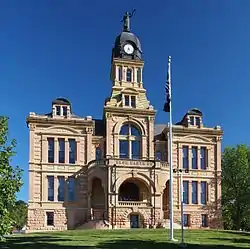 | [19] |
| 1887 | Ramsey County Courthouse | 524 Fourth Ave NE | Devils Lake | North Dakota | Demolished. | [20] | |
| 1887 | Rock County Courthouse | 204 E Brown St | Luverne | Minnesota | Listed on the National Register of Historic Places in 1977. | 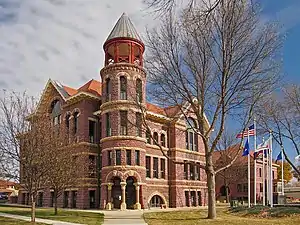 | [21] |
| 1888 | College Hall, Dakota Wesleyan University | 1200 W University Ave | Mitchell | South Dakota | Burned in 1955. | [22] | |
| 1888 | Merrill City Hall | 717 E 2nd St | Merrill | Wisconsin | Listed on the National Register of Historic Places in 1978. |  | [23] |
| 1889 | Hand County Courthouse | 415 W First Ave | Miller | South Dakota | Demolished. | [24] | |
| 1889 | Richland County Courthouse | 181 W Seminary St | Richland | Wisconsin | .jpg.webp) | [25] | |
| 1890 | Dickinson County Courthouse | 1802 Hill Ave | Spirit Lake | Iowa | Listed on the National Register of Historic Places in 1981, but demolished in 2006. |  | [26] |
| 1890 | Franklin County Courthouse | 12 1st Ave NW | Hampton | Iowa | Listed on the National Register of Historic Places in 1976. |  | [27] |
| 1890 | Kandiyohi County Courthouse | 505 Becker Ave SW | Willmar | Minnesota | Demolished. | [28] | |
| 1891 | Columbus City Hall | 105 N Dickason Blvd | Columbus | Wisconsin | Listed on the National Register of Historic Places in 1979. |  | [29] |
| 1892 | Hardin County Courthouse | 1215 Edgington Ave | Eldora | Iowa | Listed on the National Register of Historic Places in 1981. | 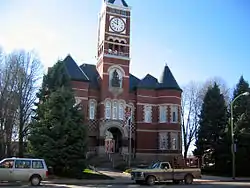 | [30] |
| 1892 | Old Main, Mayville State University | 330 3rd St NE | Mayville | North Dakota | 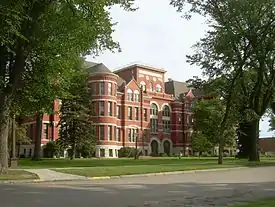 | [31] | |
| 1892 | Steele County Courthouse | 111 Main St E | Owatonna | Minnesota | Listed on the National Register of Historic Places in 1976. | 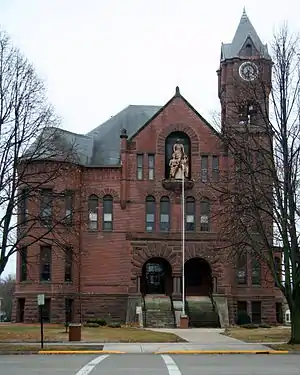 | [32] |
| 1893 | Walker School | Washington Ave | Washburn | Wisconsin | Burned in 1947. | [12] | |
Notes
- Haley's father, Joseph, was an architect who had begun practicing in Minneapolis in 1869. The younger Haley would move to Los Angeles in 1888.
- Credited to the firm of Haley & Allen.
External links
- "Truman Dudley Allen (1829-1897)," Place Makers of Nebraska: The Architects, Nebraska State Historical Society.
References
- "T. D. Allen," History of the State of Nebraska (Chicago: Western Historical Company, 1882)
- Inland Architect and Builder 6, no. 7 (January 1886): 119.
- Minneapolis City Directory for 1893-4 (Minneapolis: Minneapolis Directory Company, 1893)
- Minneapolis City Directory for 1894-5 (Minneapolis: Minneapolis Directory Company, 1894)
- "Obituary," Racine (WI) Journal, October 14 1897.
- Daily Nebraska State Journal (Lincoln, NE), December 8 1882.
- St. Paul (MN) Globe, May 16 1886.
- "David R. Davis, Architect, Dies," Racine (WI) Journal-Times, February 18 1935.
- "National Register Information System". National Register of Historic Places. National Park Service. July 9, 2010.
- "National Register of Historic Places: County Courthouses in Iowa TR".
- Henry-Russell Hitchcock and William Seale, "Notes on the Architecture," Court House: A Photographic Document, ed. Richard Pare (New York: Horizon Press, 1978): 215.
- Kathryn Bishop Eckert, The Sandstone Architecture of the Lake Superior Region (Detroit: Wayne State University Press, 2000): 195.
- David Gebhard and Gerald Mansheim, Buildings of Iowa (New York: Oxford University Press, 1993): 397-398.
- Medina County Courthouse NRHP Registration Form (1970)
- History of Medina County and Ohio (Chicago: Baskin & Battey, 1881)
- https://www.wisconsinhistory.org/Records/Property/HI70196
- "To Contractors and Builders," Daily Nebraska State Journal (Lincoln, NE), September 2 1880, 1.
- Oliver B. Pollack, Nebraska Courthouses: Contention, Compromise and Community (Charleston, SC: Arcadia Publishing, 2002)
- Blue Earth County Courthouse NRHP Registration Form (1980)
- Inland Architect and News Record 10, no. 2 (August 1887): 15.
- Rock County Courthouse and Jail NRHP Registration Form (1977)
- Inland Architect and News Record 12, no. 5 (November 1888): xvi.
- Merrill City Hall NRHP Registration Form (1978)
- Stone 1, no. 9 (January 1889): 239.
- Building 10, no. 8 (February 23 1889): 3.
- Dickinson County Courthouse NRHP Registration Form (1981)
- Franklin County Courthouse NRHP Registration Form (1976)
- "Proposals," Engineering and Building Record 21, no. 21 (April 26 1890): 336.
- Columbus City Hall NRHP Registration Form (1979)
- Hardin County Courthouse NRHP Registration Form (1981)
- History of the Red River Valley: Past and Present, vol. 1. (1909)
- David Gebhard and Tom Martinson, A Guide to the Architecture of Minnesota (Minneapolis: University of Minnesota Press, 1977)
